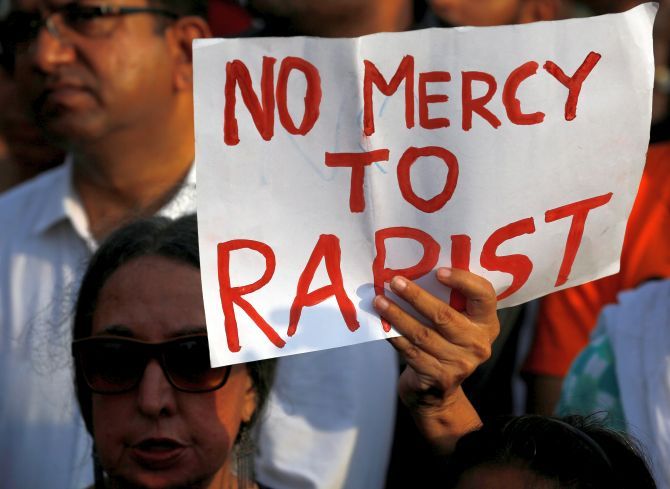What is perhaps more worrisome is that while the conviction rate in rape cases has increased marginally in recent years, the chargesheeting rate has gone down -- which means cases are not going to court.

Seven years after the brutal Nirbhaya gang rape that shook the entire nation, the conviction rate in rape cases in the country is as low as 32.2 per cent despite laws dealing with sexual assault being made stringent in the aftermath of the incident.
According to the National Crime Records Bureau data available for 2017, the total number of rape cases that went to trial in that year was 1,46,201 but only 5,822 of them resulted in conviction.
What is perhaps more worrisome is that while the conviction rate in rape cases has increased marginally in recent years, the chargesheeting rate has gone down -- which means cases are not going to court.
The chargesheeting rate in rape cases dropped to 86.6 per cent in 2017 from 95.4 per cent in 2013, the NCRB statistics show.
Shilpi Jain, who was the defence lawyer in the Alwar rape case wherein a foreign tourist was raped by Bitti Mohanty, son former Odisha director general of police B B Mohanty, said the field-level staff of police dealing with rape investigation need to be made more efficient.
"They are mostly ill-equipped, inexperienced, power gets to their head and in most cases they are extremely corrupt," said Jain.
"A sub-inspector is the highest-level officer who files a chargesheet, so one can imagine the quality of the content," said Jain.
Similarly, the prosecutors who deal with the cases at the district level are of low caliber and less driven, she said, adding that all these factors make up badly investigated cases which results in low conviction rate.
A 23-year-old paramedic student, who came to be known as Nirbhaya, was gang raped on the intervening night of December 16-17, 2012, in a running bus in south Delhi by six people.
Severely assaulted before being thrown out on the road, she succumbed to injuries on December 29 at Mount Elizabeth Hospital in Singapore.
All the accused, including a juvenile, were arrested and charged with sexual assault and murder.
One of the accused, Ram Singh, died in police custody of possible suicide on March 11, 2013 in the Tihar Jail.
A week after the horrific attack on Nirbhaya, the Justice JS Verma Committee was set up to review the criminal laws to sternly deal with sexual assault cases.
The Committee's report, which was published within a month, formed the basis of the Criminal Law (Amendment) Act of 2013 to set the maximum punishment for rape as death penalty rather than life imprisonment.
On February 3, 2013, the Criminal Law (Amendment) Ordinance, 2013 was promulgated by then President Pranab Mukherjee. It provides for amendment of the Indian Penal Code, Indian Evidence Act, and Code of Criminal Procedure, 1973, on laws related to sexual offences. The ordinance provides for the death penalty in cases of rape.
The Juvenile Justice (Care and Protection of Children) Act, 2015 was also passed by Parliament, allowing for juveniles in conflict with law in the age group of 16–18, involved in heinous offences, to be tried as adults.
But despite the two laws being made stringent, the rate of conviction in rape cases remain as low as 32 per cent, as per NCRB data.











 © 2025
© 2025